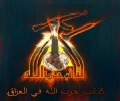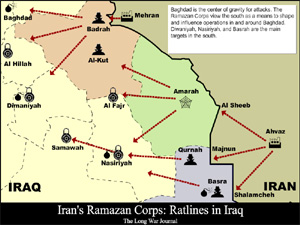 |
| Hezbollah Brigades' logo is nearly identical to that of Lebanese Hezbollah. |
US forces have stepped up operations against the Iranian-backed Shia terror groups operating in Baghdad after a relative lull in November. Fourteen operatives from the League of the Righteous and the Hezbollah Brigades were captured in Baghdad during raids today.
Coalition forces - likely the hunter-killer teams from Task Force 88 - captured eight members of the League of the Righteous (Asaib Ahl al Haq) during two operations in Baghdad's Adhamiyah and New Baghdad districts early Sunday morning. Six Hezbollah Brigades operatives were captured during two operations inside Adhamiyah.
Raids targeting the two Iranian-backed terror groups have been infrequent during the month of November. Only two other Hezbollah Brigades fighters were captured during a Nov. 11 operation in Baghdad. Twenty-eight Hezbollah Brigades operatives were captured during multiple raids in October.
The League of the Righteous is splinter groups that broke away from Muqtada al Sadr's Mahdi Army after Sadr announced he would disband the Mahdi Army and form a small, secretive military arm to fight Coalition forces in June. Sadr's moves caused shockwaves in the Mahdi Army, as some of the militia's leaders wished to continue the fight against US forces in Baghdad and in southern and central Iraq.
The League of the Righteous receives funding, training, weapons, and direction from Iran's Qods Force, the country's secretive special operations group that backs terror groups such as Lebanese Hezbollah. The League of the Righteous conducts attacks with the deadly, armor-piercing explosively formed projectiles, or EFPs, as well as the more conventional roads bombs.
The size of the League of the Righteous is unknown, but hundreds of members of the group were killed, captured, or fled to Iran during the Iraqi government offensive against the Mahdi Army from March to July of this year, according to the US military.
Sadr is looking to pull the rank and file of the League back into the fold of the Sadr's political movement. In a recent message issued by Sadr where he rejected the US-Iraqi security agreement, he said he "extends his hand to the mujahideen in the so-called Asaib but not their leaderships who have been distracted by politics and mortal life from the [two late] Sadrs and the interests of Iraq and Iraqis."
The Hezbollah Brigades or the Kata'ib Hezbollah, has been active for more than a year and has increased its profile by conducting attacks against US and Iraqi forces using the deadly explosively formed penetrators, or EFPs, and improvised rocket-assisted mortars, which have been described as flying improvised explosive devices. The Hezbollah Brigades has posted videos of these attacks on the Internet.
The terror group is an offshoot of Iranian-trained Special Groups, the US military said last summer. Hezbollah Brigades receives funding, training, logistics, guidance, and material support from Iran's Qods Force.
Suspected Qods Force officer released
Iraqi and US forces have detained several Qods Forces officers operating in southern and central Iraq over the past month. Iraqi and US forces have killed one Qods Force operative and captured 11 since mid-October.
On Nov. 18, US forces detained a suspected Qods Force commander as he attempted to leave Iraq via Baghdad International Airport. The US military said the Qods officer used a construction company as a front for his activates.
The Iranian, whose name is Nader Qorbani, was released on the request of the Iraqi government. "We called them and asked them to release him and we can confirm that the arrest was unlawful," Deputy Foreign Minister Labeed Abbawi told Reuters. "He's working here on a contract and he's been working here for some time."
The US military did not comment on the detention, and referred inquiries to the Iraqi government. "Coalition Forces have long recognized Iraq's sovereignty in making decisions concerning their own legal affairs," a US military spokesman told the news agency.
Background on Iran's backing of the Shia terror groups
| Flash Presentation on the Ramazan Corps and the Iranian Ratlines into Iraq. Click the map to view. A Flash Player is required to view, click to download. |
Qods Force has supported various Shia militias and terror groups inside Iraq, including the Mahdi Army, helping to build them along the same lines as Lebanese Hezbollah. Iran denies the charges, but captive Shia terrorists admit to being recruited by Iranian agents and then transported into Iran for training.
Iran established the Ramazan Corps immediately after the fall of Saddam Hussein's regime to direct operations inside Iraq. The US military says Iran and Lebanese Hezbollah have helped establish, fund, train, and arm, and have provided operational support for Shia terror groups such as the Hezbollah Brigades and the League of the Righteous. The US military refers to these groups as well as the Iranian-backed elements of the Mahdi Army as the "Special Groups." These groups train in camps inside Iran.
US and Iraqi forces have captured several high-level Qods Force officers inside Iraq since late 2006. Among those captured are Mahmud Farhadi, one of the three Iranian regional commanders in the Ramazan Corps; Ali Mussa Daqduq, a senior Lebanese Hezbollah operative; Qais Qazali, the leader of the Qazali Network; and Azhar al Dulaimi, one of Qazali's senior tactical commanders. The US has imposed sanctions on Major General Ahmad Foruzandeh, the former Qods Force commander, and Abdul Reza Shahlai, a deputy commander in Iran's Qods Force, for backing Shia terror groups inside Iraq.
US military officers believe Iran is ramping up its operations inside Iraq after its surrogates suffered a major defeat at the hands of the Iraqi military during the spring and summer of 2008. Iraqi troops went on the offensive against the Mahdi Army and other Iranian-backed terror groups in Baghdad and central and southern Iraq. More than 2,000 Mahdi Army members were killed and thousands more were wounded. The operation forced Muqtada al Sadr to agree to a cease-fire and disband the Mahdi Army.
For more information on Iran’s involvement in supporting Shia terror groups in Iraq, see:
• Iranian Qods Force Agents Detained in Irbil Raid
Jan. 14, 2007
• The Karbala attack and the IRGC
Jan. 26, 2007
• Iran, Hezbollah train Iraqi Shia "Secret Cells"
July 2, 2007
• Surging in Wasit Province
Sept. 18, 2007
• Captured Iranian Qods Force officer a regional commander in Iraq
Oct. 3, 2007
• Iran's Ramazan Corps and the ratlines into Iraq
Dec. 5, 2007
• Sadr forms new unit to attack US forces
June 13, 2008
• Sadrist movement withdraws from political process
June 15, 2008
• Mahdi Army decimated during recent fighting
June 26, 2008
• Iraqi forces detain Sadrist leaders, uncover Special Groups headquarters in Amarah
July 2, 2008
• Iraqi forces detain Sadrist leaders, uncover Special Groups headquarters in Amarah
July 2, 2008
• Iran continues to train Shia terror groups for attacks in Iraq
Aug. 15, 2008
• New Special Groups splinter emerges on Iraqi scene
Aug. 20, 2008
• Iraqi troops find EFP factory in Sadr City
Oct. 30, 2008



